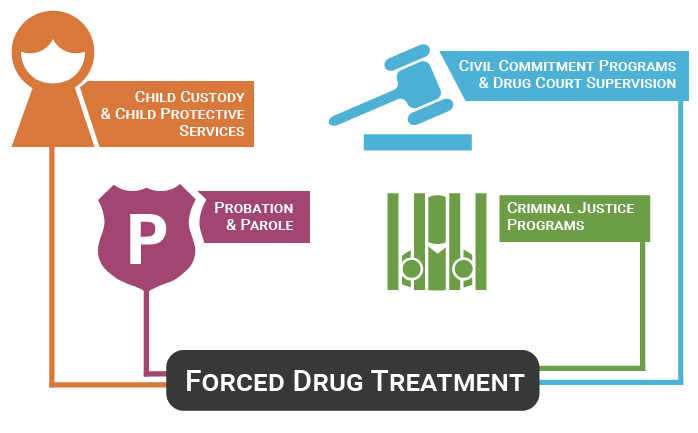
by Katharine Celentano
Large swaths of the U.S. public now believe that the war on drugs does more harm than good and that punitive frameworks are ineffective at addressing problematic drug use. Calls for more jail beds have been replaced with calls for more treatment funding and treatment beds.
But here’s the thing: Throughout history and to this day, treatment itself has often meant punishment. Without a careful interrogation of what we mean by “treatment” and the history of coercion, criminal justice reforms will be reforms in name only. This moment instead calls for patient- and rights-centered alternatives that prioritize health and human dignity.
Amidst an overdose crisis of historic proportions, proponents of coercion are deftly adopting criminal justice reform rhetoric to market “alternatives” that simply cloak the mechanics of the criminal justice system in public health interventions. The indignities and harmful consequences commonly associated with criminalization are not unique to it and can in fact also be produced by public health and treatment interventions that fail to prioritize consent.
Civil commitment laws, like Section 5250 in the California Welfare and Institutions Code, strip individuals of their rights, forcing them into care they may neither want nor need. In the Bay Area, state legislators are facing increasing oppositionto a proposed bill that would expand forced treatment.
Drug courts, which coerce people into treatment under threat of criminal punishment, continue to expand nationally. But three decades of evidence clearly shows that most drug courts do not reduce imprisonment, do not save money, do not improve public safety and ultimately fail to help people struggling with drug problems.
Today’s treatment facilities too often mirror the cruelty of not just prisons but also the American asylum, a chapter frequently erased from our history books. Involuntary detention is incarceration, whether we call it a hospital or a jail. Community supervision is community supervision, whether we call it probation or involuntary outpatient commitment.
Involuntary detention is incarceration, whether we call it a hospital or a jail. Community supervision is community supervision, whether we call it probation or involuntary outpatient commitment.
Indeed, purportedly health-oriented interventions framed as “for their own good” can in some ways be even more pernicious than criminal justice interventions.
Drug policy and harm reduction advocates have much to learn from the mental health recovery and disability rights movements who have long engaged in the fight against punishment disguised as treatment. These movements must build bridges in our common fight. We must develop and pursue a unified frame that replaces the framework of compliance with one of consent, while advocating for community-based solutions grounded in the health and dignity of people and communities.
Together, we can bring forth an intersectional analysis of coercive treatment and institutionalization that unpacks the history of coercion and the ways that racism, stigmatization, paternalism, ableism and profit drive the use of force against people who use drugs, people diagnosed with mental illness and people with disabilities.
That is why the Drug Policy Alliance and more than 20 organizational partners are organizing “Coercive Treatment – Moving Beyond ‘For Your Own Good.’” This conference and workshop series on May 16-17 at UC Hastings College of Law in San Francisco will unite leaders from the drug policy and harm reduction, mental health and disability rights movements.
While reducing incarceration is pivotal, this can’t be the only metric of our success. We must reject all forms of coercive and punitive treatment, while prioritizing truly people-centered and people-driven social supports. History warns us: Anything else will doom us to a vicious cycle, from incarceration to institutionalization and back again.
Come to the conference
Register for the “Coercive Treatment – Moving Beyond ‘For Your Own Good’” conference at https://www.eventbrite.com/e/coercive-treatmentmoving-beyond-for-your-own-good-conference-tickets-59491773496. It’s free. The conference will be held at UC Hastings College of Law, 198 McAllister St., San Francisco, on May 16, 8:30 a.m.-5:40 p.m., and May 17, 8:30 a.m.-1 p.m.
RSVP here for May 16 conference.
RSVP here for May 17 workshops.
Katharine Celentano is policy coordinator at the Drug Policy Alliance. A graduate of Columbia University, she serves on the board of the Columbia Alumni Association. Katharine’s experiences as a former client of a residential psychiatric facility and losing loved ones to overdose, incarceration and trauma motivate her work. She can be reached at kcelentano@drugpolicy.org.





